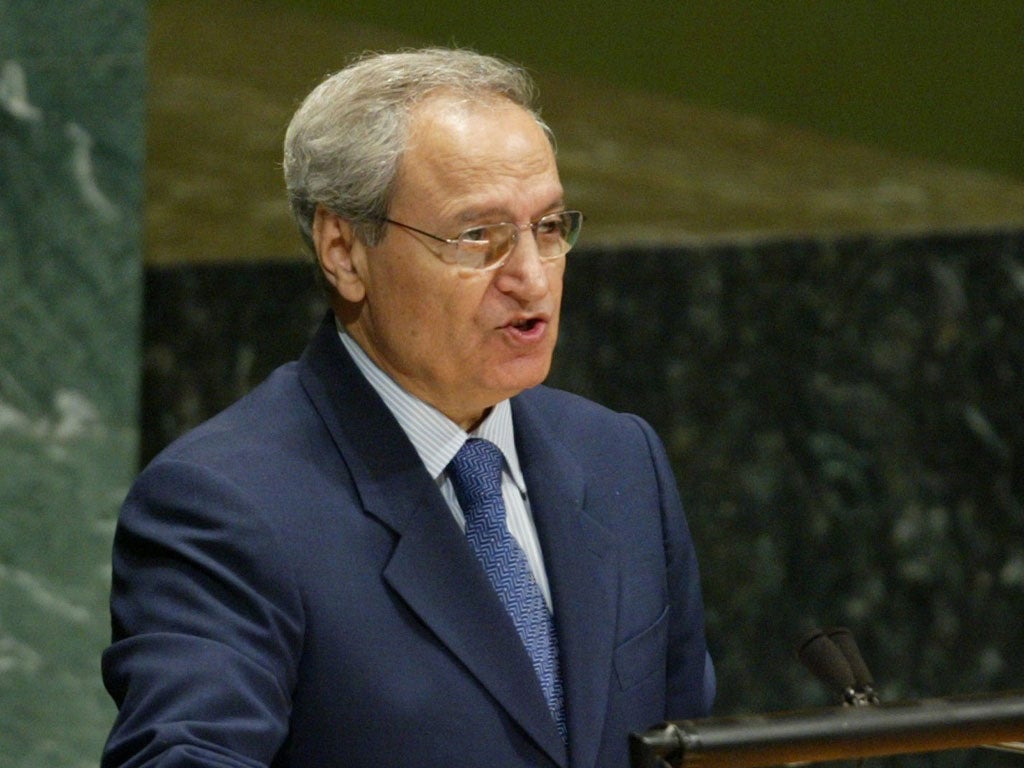
Your support helps us to tell the story
From reproductive rights to climate change to Big Tech, The Independent is on the ground when the story is developing. Whether it's investigating the financials of Elon Musk's pro-Trump PAC or producing our latest documentary, 'The A Word', which shines a light on the American women fighting for reproductive rights, we know how important it is to parse out the facts from the messaging.
At such a critical moment in US history, we need reporters on the ground. Your donation allows us to keep sending journalists to speak to both sides of the story.
The Independent is trusted by Americans across the entire political spectrum. And unlike many other quality news outlets, we choose not to lock Americans out of our reporting and analysis with paywalls. We believe quality journalism should be available to everyone, paid for by those who can afford it.
Your support makes all the difference.Syria denied reports yesterday that President Bashar al-Assad's deputy had defected, and his forces pressed an offensive against rebels, bombarding parts of Aleppo in the north and hitting an insurgent-held town in the oil-producing east.
Vice-President Farouq al-Shara "never thought for a moment about leaving the country", said a statement from his office broadcast on state television and issued in response to reports that the veteran Ba'ath Party loyalist had tried to defect to Jordan. Mr Assad, battling a 17-month rebellion led by Syria's Sunni Muslim majority that has turned into a civil war, has suffered a string of defections including his prime minister Riyadh Hijab two weeks ago.
Mr Shara, whose cousin – an intelligence officer – announced his own defection on Thursday, is a Sunni Muslim from Deraa province where the revolt first erupted against Assad. He comes from the minority Alawite sect which is an offshoot of Shia Islam. The 73-year-old former foreign minister kept a low profile as the rebellion escalated but appeared in public last month at a state funeral for three of Mr Assad's top security officials killed in a bomb attack in Damascus.
The statement said he had worked since the start of the uprising to find a political solution to end the bloodshed and welcomed the appointment of the veteran Algerian diplomat Lakhdar Brahimi as a new international mediator for Syria. Mr Brahimi, who hesitated for days to accept a job that France's United Nations envoy Gérard Araud called an "impossible mission," will replace former UN Secretary-General Kofi Annan, who is stepping down at the end of the month. Mr Annan's six-point plan to end the violence and move towards political negotiations was based on an April ceasefire agreement that never took hold. The conflict has deepened since then with both sides stepping up attacks.
Mr Brahimi, a Nobel Peace laureate, will have a new title, Joint Special Representative for Syria. Diplomats said the change was to distance him from Mr Annan, who had complained that his Syria peace plan was hampered by a divided Security Council. In an interview with France 24 television, Mr Brahimi said he would soon meet with the Security Council.
Humanitarian conditions in Syria have deteriorated as fighting worsens, cutting off civilians from food supplies, health care and other assistance, UN agencies say. Sewage-contaminated water has led to a diarrhoea outbreak in the countryside around Damascus, with 103 suspected cases. Some 1.2 million people are uprooted in Syria, many staying in schools or other public buildings, UN officials say. UN humanitarian chief Baroness Valerie Amos, ending a visit to Syria, said on Thursday that up to 2.5 million people needed aid there.
Mr Assad's forces have turned increasingly to air power to hold back lightly armed rebels in the capital, Damascus, and Aleppo, a northern commercial hub and the country's largest city. More than 18,000 people have died and some 170,000 have fled the country as a result of the fighting, according to the United Nations.
The Syrian Observatory for Human Rights (SOHR) said the army bombarded neighbourhoods in Aleppo. Rebels hold several districts there and have tried to push back an army counteroffensive. State television said soldiers "cleared terrorists and mercenaries" – terms used by the authorities to describe Assad's armed opponents – from the western district of Saif al-Dawla, where some of the heaviest fighting has taken place.
Internet footage which activists said was filmed in Saif al-Dawla on Saturday showed a plane making a low pass over buildings and dropping two bombs.
The SOHR also said at least 20 armoured vehicles moved into the eastern town of Mayadeen in Deir al-Zor province, where Syria's 200,000 barrels per day of oil are produced. In the town of Tel, north of Damascus, local activists said the bodies of 40 people killed in bombardment were gathered together for a joint burial.
Join our commenting forum
Join thought-provoking conversations, follow other Independent readers and see their replies
Comments